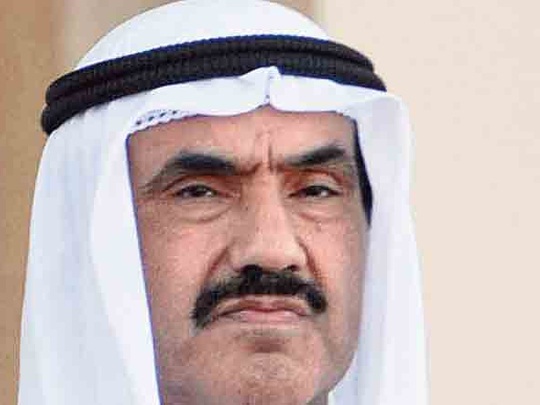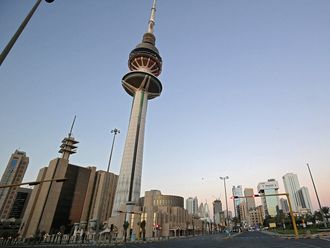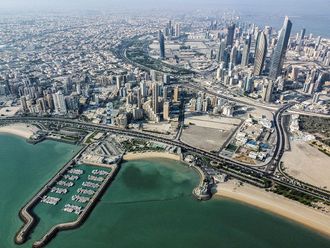
Kuwait City: Kuwait's prime minister on Wednesday eased past a no-cooperation vote after 25 lawmakers defeated the motion submitted last week by the opposition.
According to the results, 22 lawmakers voted to push Shaikh Nasser Al Mohammad to resign, while one lawmaker, Abdullah Al Roomi, abstained from voting.
Only one of the four women MPs elected in a historic breakthrough to the parliament, Aseel Al Awadhi, voted in support of the motion.
Shaikh Nasser has now survived three attempts by the opposition between December 2009 and today to force him to resign.
Prior to today's voting, MPs Shuaib Al Muwaizri and Waleed Al Tabtabai spoke for the no-cooperation motion, while MPs Ali Al Rashed and Husain Al Qallaf gave short speeches to urge fellow lawmakers to defeat the move to oust the government.
The narrow victory achieved by the government camp is likely to reinforce the determination of the opposition to go ahead with its plans announced on Tuesday to take to the street to exert pressure on Shaikh Nasser to resign.
MP Muslim Al Barrak, one of the no-cooperation move leaders, said that the opposition was eyeing other options to bring down the government, including resorting to street pressure tactics.
"We will go to the street. The street is many countries has caused the fall of governments and we are confident that the Kuwaiti street will push for the resignation of Shaikh Nasser's government," MP Muslim Al Barrak said. "The street has often annoyed MPs and even the government and we will exercise our right to resort to it. The pressure will start right after the outcome of the no-cooperation vote and we will be practical about it," Al Barrak said.
However, the government rejected the threat and insisted that divergences could be addressed in the parliament.
"Whoever has an opinion should use the parliament, and not the street," Radhwan Al Radhwan, the state minister for cabinet affairs, said.
"Kuwait is a country of law and institutions, and everyone should behave and act according to the law and the constitution. After the parliament reasserts its confidence in the prime minister, the lawmakers and the government should devote themselves to the nation-building process," he said.
The no-cooperation motion was filed by ten opposition lawmakers on December 28 following an 11-hour grilling of Shaikh Nasser Al Mohammad over clashes between anti-right police and people at a rally in Kuwait City on December 8.
The opposition blamed the authorities for their alleged "heavy-handedness" in dealing with the people, including MPs and one university academic.
However, the police said that it was striving to maintain law and order after people taunted them and broke the law by holding their rally in the open.
The opposition seized the occasion and launched a robust drive, including unprecedented street pressure tactics, to force for the dismissal of the government or the dissolution of the parliament.
Kuwait political turmoil timeline
December 8: Clashes between anti-riot police and people at a rally in Kuwait City.
December 9: MPs denounce the "police onslaught" and pledge parliamentary action
December 13: MPs Muslim Al Barrak, Jamaan Al Harbash and Saleh Al Mulla file a motion to grill Prime Minister Shaikh Nasser Al Mohammad for "violation of the constitution and assault on public freedoms"
December 28: Shaikh Nasser Al Mohammad faces day-long quizzing
December 28: Ten MPs file a no-cooperation motion against the prime minister
January 5: Shaikh Nasser survives a no-cooperation motion.
Shaikh Nasser grilled three times in 12 months
Shaikh Nasser Al Mohammad is the first prime minister in Kuwait and the only Arab sitting prime minister to face grilling by the parliament. Supporters say it is a clear testimony to democracy in Kuwait.
December 8, 2009: Shaikh Nasser is grilled by MP Faisal Al Mislim over an alleged cheque given by the premier to a former lawmaker in 2008.
June 8, 2010: Shaikh Nasser is scheduled to be grilled by MP Khalid Al Tahoos over government inaction on pollution in a residential area. The grilling was aborted after Al Tahoos failed to show up.
December 28: Shaikh Nasser is grilled over clashes between anti-riot police and people, including MPs, at a rally in Kuwait City.
January 5: Shaikh Nasser survives the no-cooperation motion with 25 votes in his favour and 22 against him.
Shaikh Nasser's professional career
- 15 August 1964 - Third Secretary at the Ministry of Foreign Affairs
- 2 October 1964 - Joined the Permanent Mission of Kuwait to the United Nations in New York.
- 1 June 1965 - Transferred from the Kuwait Permanent Mission in New York to the Ministry of Foreign Affairs.
- 5 December 1965 - Minister Plenipotentiary at the Ministry of Foreign Affairs
- 16 December 1965 - First Permanent Representative of the State of Kuwait to the European Office of the United Nations in Geneva
- April 1966 - Inaugurated the First Premises of the Kuwait Permanent Mission in Geneva
- June 1966 - First Consul General of Kuwait to the Swiss Confederation in Geneva
- 6 October 1968 - Ambassador Extra-Ordinary and Plenipotentiary to Iran
- 1971 - Non-resident Ambassador to Afghanistan.
- 1975 - 1979 - The Dean of the Diplomatic Corps in Iran and Afghanistan.
- 22 May 1979 - Transferred to the Ministry of Foreign Affairs.
- 1979 - 1985 - Under Secretary of the Ministry of Information.
- 1985 - 1988 - Minister of Information, President of the National Council for Culture, Arts, and Letters.
- 1988 - 1990 - Minister of Social Affairs and Labour.
- June 1990 - April 1991 - Minister of State for Foreign Affairs
- 1991 - 2006 - Minister of Al-Diwan Al-Amiri Affairs (Royal Court).
- 7 February 2006 – Present: Prime Minister of the State of Kuwait.











